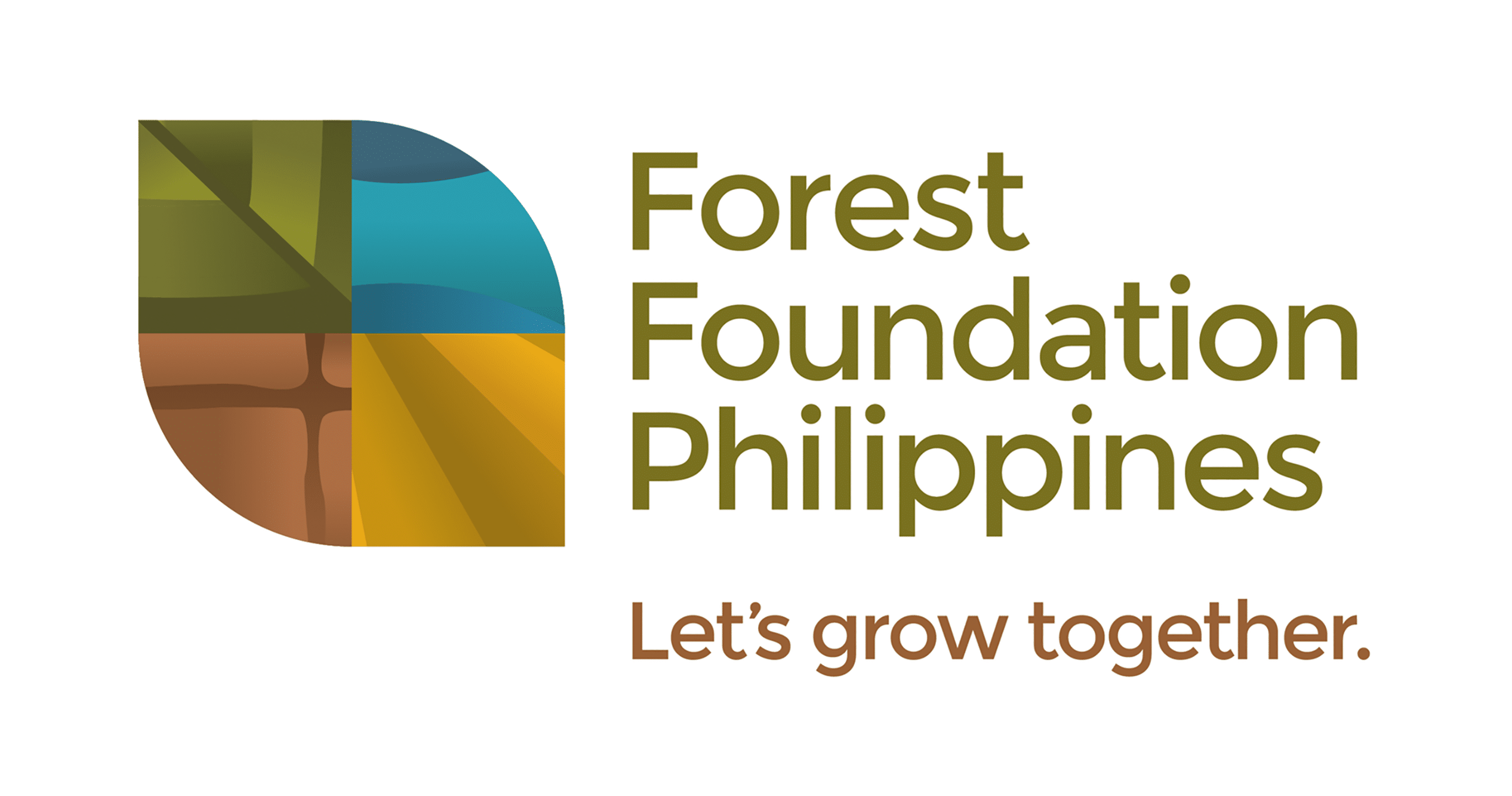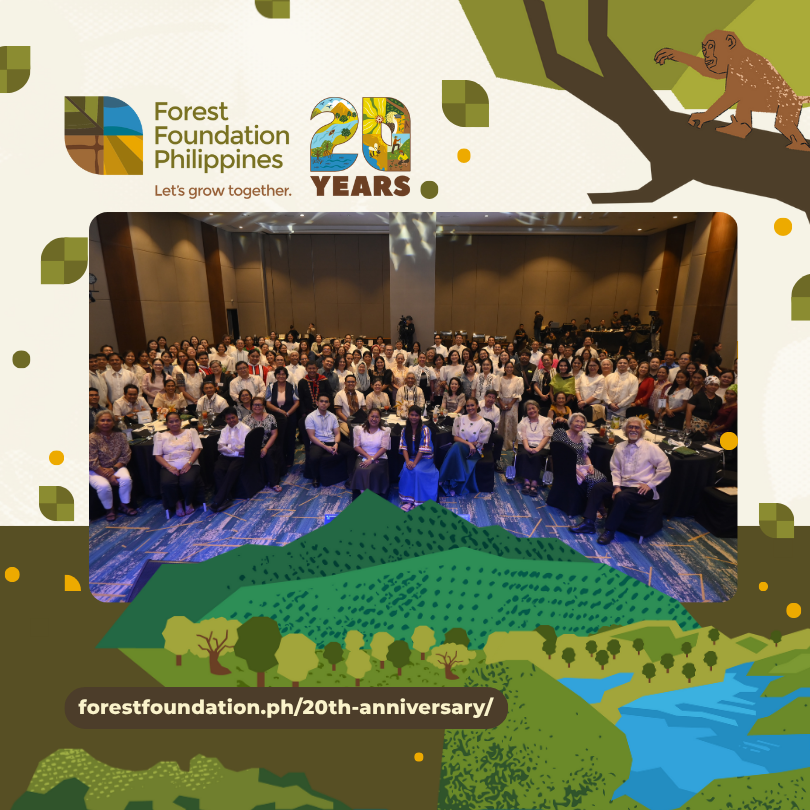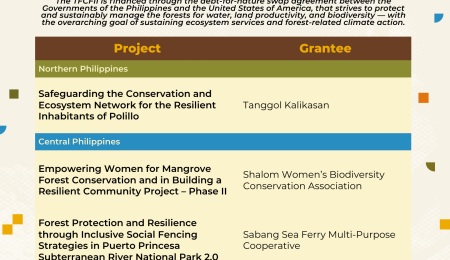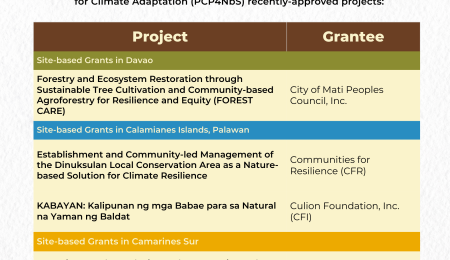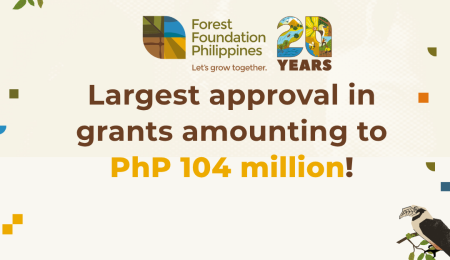Forest Foundation Philippines marked its 20th anniversary with a series of events that brought together grantees, partners, and forest conservation advocates from across the country. The activities — PUNLA: A Multistakeholder Forum on Nature-based Solutions (NbS), the Interlandscape Knowledge Exchange (IKEx), the 20th Anniversary Night, and the Sustainable and Inclusive Landscape Governance (SILG) Closing Program — reflected the Foundation’s enduring commitment to growing forests, opportunities, partnerships, and advocates that advance sustainable forest management.
For the past two decades, the Foundation has been at the forefront of empowering organizations and communities to protect and conserve forests, ensuring water security, land productivity, and biodiversity. Its work supports the overarching goal of sustaining ecosystem services and driving forest-related climate action across the country’s most critical forest landscapes — Sierra Madre, Palawan, Samar and Leyte, and Mindanao. These landscapes, which hold significant forest cover, provide essential ecosystem services that sustain regional and local economies and serve as home to many forest-dependent communities, particularly the Indigenous Peoples (IPs).
PUNLA: A Multistakeholder Forum on Nature-based Solutions (NbS)
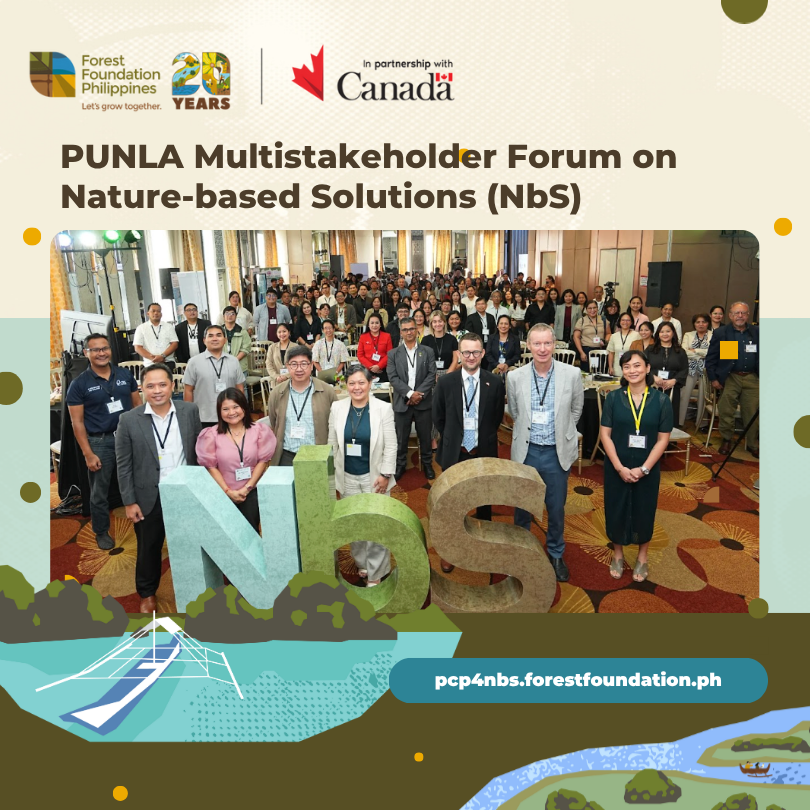
The celebration opened with PUNLA: A Multistakeholder Forum on Nature-based Solutions (NbS) one of the first national-level gatherings that brought together experts, practitioners, and local and national stakeholders — including indigenous and local communities already implementing NbS — to continue and strengthen discussions on NbS. The Forum, organized by the Foundation, with the Department of Environment and Natural Resources (DENR) and the Government of Canada, underscored NbS as vital for restoring ecosystems while addressing climate, biodiversity, and social challenges in the Philippines, and highlighted the need for stronger national understanding and cross-sector coordination.
The PUNLA NbS Forum featured panel discussions, dash talks, and workshops, where panelists, community representatives and participants reiterated the importance of integrating indigenous and local knowledge with evidence-based approaches in NbS design. The Forum highlighted gender-responsive, youth-led, and community-driven NbS, and called for innovative financing, coherent governance, and strong partnerships to scale and sustain these initiatives.
The Foundation’s Philippines-Canada Partnership on Nature-based Solutions (NbS) for Climate Adaptation (PCP4NbS) Program was highlighted as a model of inclusive, community-led actions across six climate-vulnerable, biodiversity-rich areas that blend traditional knowledge, local leadership, and science. Ms. Edwina Garchitorena, Chairperson of the Board of Trustees, stressed that NbS bridges environmental and development goals, and that strong collaboration with partners is essential to institutionalizing them.
Mr. Simon Snoxell, Head of Cooperation and Counsellor (Development) at the Embassy of Canada to the Philippines echoed this, and said, “This multi-sectoral collaboration builds on local solutions, showing how scaling community-driven efforts can strengthen resilience for both people and ecosystems nationwide.”
The Foundation joined fellow members of the DENR-convened multistakeholder NbS Support Network, in pledging support to drive actionable commitments towards implementation of high-integrity NbS in the country. With partners from the academe, civil society, local communities and development partners, beginning with the PUNLA: NbS Forum, the group aims to develop a shared understanding of NbS, enable actionable commitments and follow-up mechanisms to ensure sustained collaboration, implementation, and institutionalization of NbS in the country.
The Forum also marked a milestone in global-local alignment with the launch of the IUCN National Committee Philippines, composed of IUCN members in the Philippines. The Committee aims to localize global conservation frameworks and amplify the country’s voice in international environmental policy.
Interlandscape Knowledge Exchange (IKEx)
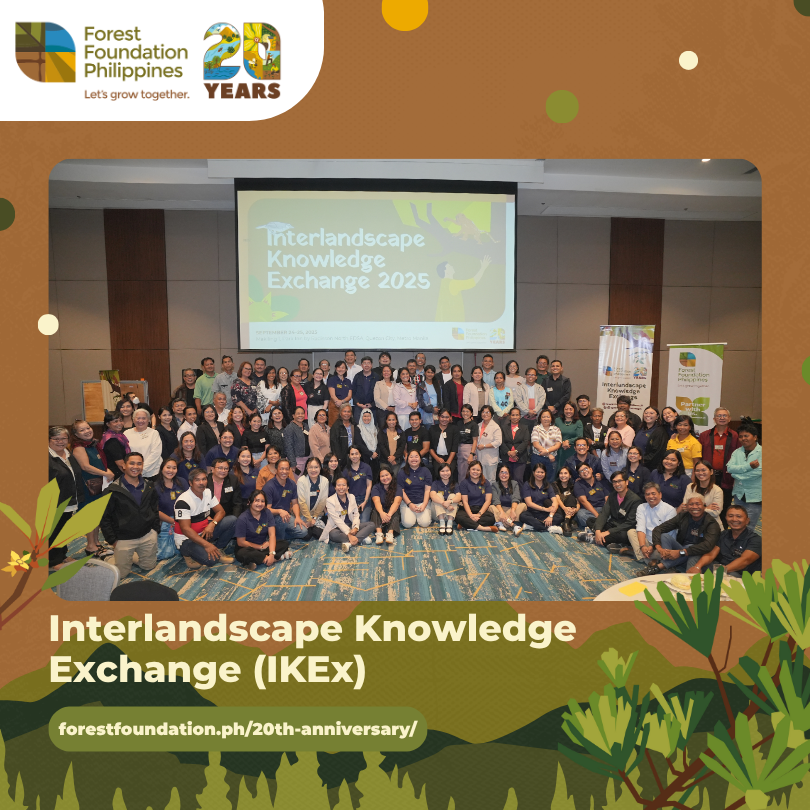
The celebration continued with the inaugural Interlandscape Knowledge Exchange (IKEx), which brought together the Foundation’s partners from its focal landscapes and special project sites to share lessons learned and best practices on sustainable forest management from their projects. The discussions revolved around six key thematic areas that represent the areas of work supported by the Foundation’s grant programs: Watershed Management; Sustainable Livelihoods; Community Empowerment and Leadership; Coastal Forest Restoration; Research; and Advocacy.
In parallel, the event featured partnership sessions that showcased ongoing programs and funding opportunities from the Foundation’s key institutional partners, including the DENR, Forest Management Bureau, Foundation for a Sustainable Society, Peace and Equity Foundation, and Embassy of Canada in the Philippines.
The IKEx fostered meaningful knowledge sharing and cross-learning among grantees and partners, strengthening collaboration and collective action across landscapes.
For more information on the projects featured during the IKEx, visit this page.
20th Anniversary Night: 20 Years of Growing Together
The spirit of collaboration carried into the evening celebration during the 20th Anniversary Night, a fitting tribute to two decades of the Foundation’s commitment to empowering communities to protect and conserve forests. The event celebrated not only the Foundation’s milestone year but also the collective impact of its grant programs and partnerships that have protected, restored, and conserved forest landscapes across the country.
The Foundation also paid tribute to its invaluable allies — the DENR, Department of Finance (DOF), and the U.S. Embassy in the Philippines — which played a vital role in establishing the Foundation. It likewise honored its grantees, partners, and members of the Board of Trustees throughout the years, whose collective efforts have shaped the Foundation’s growth and impact since its operationalization in 2005.
Ms. Garchitorena thanked the Foundation’s Trustees, grantees, partners, and staff for working tirelessly with the Foundation to protect and conserve the country’s forests. She said, “This anniversary is not only a milestone for the Foundation, but more importantly, a celebration of your collective contribution and support. It is because of all of you that the Foundation stands today as a testament to the power of partnership and shared commitment to our forests and our future. As we look back with gratitude, we also look forward with hope and determination — to build on our achievements, to learn from our experiences, and to continue nurturing forests and communities together for the next 20 years and beyond.”
Undersecretary Maria Luwalhati C. Dorotan-Tiuseco of the DOF also shared a message of support for the Foundation. She acknowledged the valuable work of the Foundation in conserving the environment and challenged the Foundation to continue to innovate, collaborate, and expand its reach.
Atty. Jose Andres Canivel, Executive Director, closed the celebration with a heartfelt toast — to the past 20 years of growing together, and to a future of stronger partnerships, empowered communities, and lush forests.
Learn more about the Foundation’s impacts for the past 20 years here.
Sustainable and Inclusive Landscape Governance (SILG) Closing Program

The Sustainable and Inclusive Landscape Governance (SILG) Closing Program, held under the theme “Beyond SILG 2.0,” marked not just an ending but a heartfelt homecoming. Graced by the Foundation’s Board of Trustees, Executive Director, staff, landscape, and grants partners, the celebration reflected on four years of shared learning and collaboration, rekindling hope for what lies beyond the program’s closing.
Mr. Dennis Joseph Salvador, Program Committee Chairperson, opened the event by highlighting how Landscape Governance fosters inclusive dialogues and joint decision-making for sustainable resource management. Ms. Rosalien Jeezer, who spoke on behalf of Tropenbos International, echoed this vision, emphasizing the power of collective action among civil society, Indigenous Peoples, and NGOs in building equitable landscapes.
Infused with the familiar “SILG touch,” the program’s camp-like atmosphere encouraged movement, sharing, and connection. Through segments like Kumustahan Express and Kuwentong SILG 2.0, partners reflected on their journeys, culminating in a showcase of Knowledge Products that bridged past lessons with future aspirations.
Among the stories shared, one resonated deeply:“Para akong puno at kayo ang araw at ulan na nagpayabong sa akin.” (I am like a tree and you were the sun and the rain that helped me grow). Nanay Joyce Benedicto warmly shared what the relationship between her and the SILG Program has flourished into. She was one of the most active Indigenous women who participated in the Nanay Camps held in southern Palawan. On the other hand, describing it as a retreat — Atty. Karen Galicia, one of the Program’s grantees, emphasized how the event felt like a rejuvenating pause that reignited her passion to continue environmental work and empower others to do the same.
In closing, Atty. Canivel expressed gratitude to partners who journeyed with SILG through the years. He reminded everyone that while one chapter has reached its end, many new trails await exploration. The program is not just about what has ended, but about the countless beginnings that follow beyond SILG as the stories continue.
Rooted in History
The Foundation was established in 2002 under two bilateral agreements between the Governments of the Philippines and the United States of America. Through the Tropical Forest Conservation Act (TFCA), a“debt-for-nature” agreement,portions of Philippine debt were converted into dedicated funds, which are now managed as Tropical Forest Conservation Funds (TFCF I and II) — turning international debt into a living investment to empower the people to protect and conserve the country’s forests.
Under the First Tropical Forest Conservation Fund (TFCF I), US$ 8.25 million was allocated for the protection and conservation of forests from 2005 to 2016. This investment translated into 472 projects funded, improving the management of over 1.5 million hectares of forest lands and restoring more than 4,200 hectares of forest lands. It also supported the establishment of 60 community-level enterprises and the protection of 40 community-conserved areas — proof that forest conservation goes hand in hand with community empowerment.
With the promising results of TFCF I, the Foundation was entrusted with US$ 32 million under the Second Tropical Forest Conservation Fund (TFCF II) for 2017 to 2027. Under TFCF II, more than US$ 32M million is being managed to support projects that protect and restore forest lands, empower communities to pursue sustainable livelihoods, and advance research, policies, and advocacy projects for inclusive forest management.
Together, TFCF I and II demonstrate how innovative financing can deliver long-term conservation outcomes, enabling the Foundation to protect forests while uplifting the lives of people who depend on them.
Next 20 Years: Looking Ahead
The Foundation’s work demonstrates that people and forests can thrive together. Beyond its initial TFCF funds from the governments of the Philippines and United States of America, the Foundation continues to serve as a platform for co-financing, knowledge exchange, and collaborative program development, ensuring that resources are maximized to achieve greater collective impact.
To date, the Foundation has mobilized nearly US$ 7 million in support from partners such as Global Affairs Canada, USAID, the United Nations Development Programme (UNDP), Tropenbos International, Conservation International, and the private sector.
As the Foundation looks ahead to the next 20 years, it remains steadfast in its mission to protect and conserve the country’s forests for future generations.
